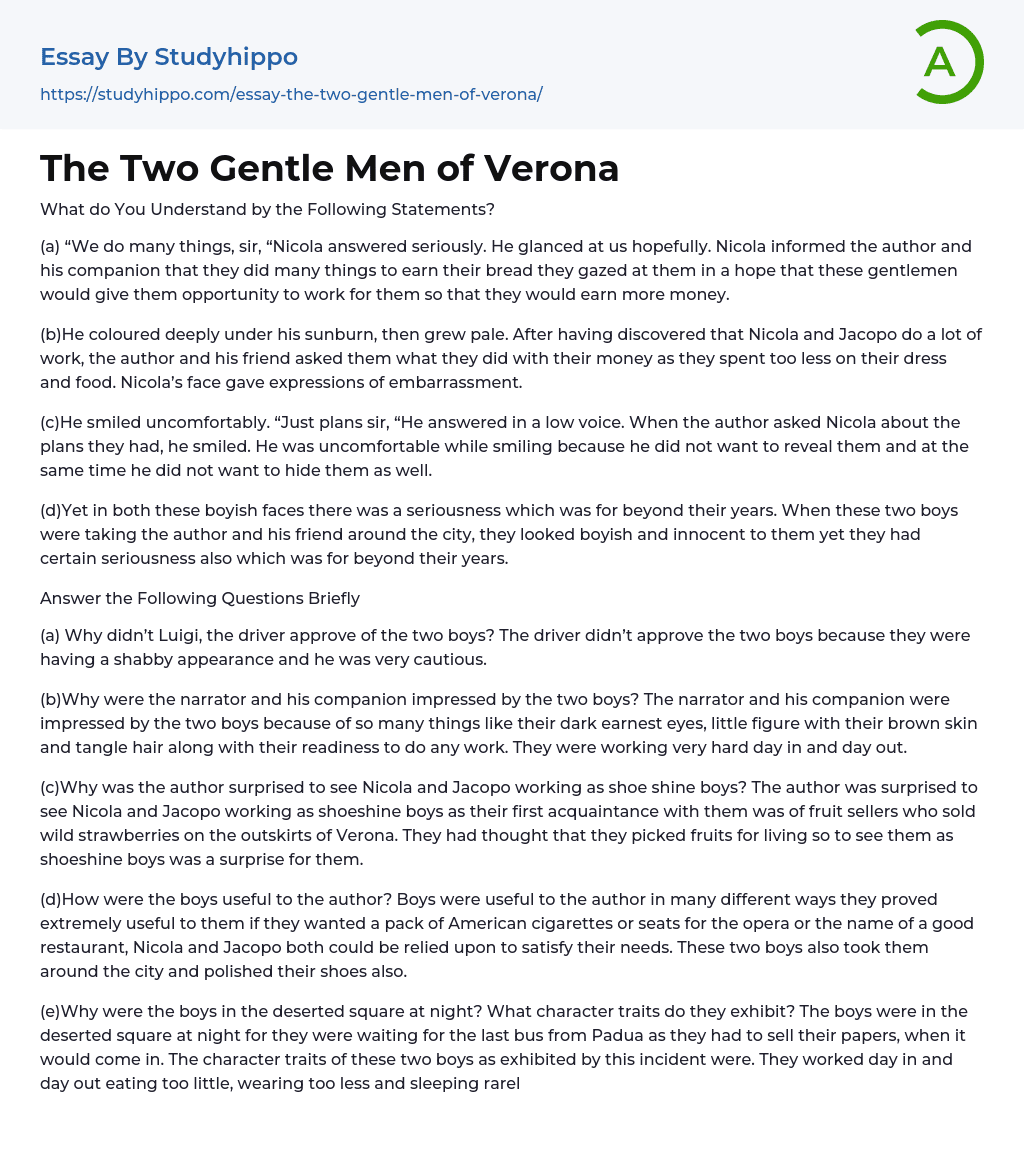What is Your Interpretation of the Following Statements?
(a) "We do many things, sir," Nicola replied earnestly.
He looked at us with hope, hoping that we would give them an opportunity to work for us and earn more money. (b)Blushing under his sunburn, he then turned pale. After learning that Nicola and Jacopo work very hard, we asked them how they spend their money given that they spend very little on their clothing and food.
Nicola's face displayed signs of embarrassment as he uncomfortably smiled and replied in a low voice, "Just plans, sir." The author inquired about these plans and Nicola responded with a smile. This smile was uncomfortable because he didn't want to disclose the plans, yet he also didn't want to conceal them. Both of these youthful faces carried a level of seriousne
...ss that exceeded their age.
When the author and his friend were being shown around the city by these two boys, they appeared boyish and innocent yet also displayed a level of seriousness that went beyond their years.
Answer the Following Questions Briefly
(a) Why did Luigi, the driver, disapprove of the two boys? Luigi disapproved of the two boys because of their shabby appearance and because he was very cautious.
(b) Why were the narrator and his companion impressed by the two boys? The narrator and his companion were impressed by the two boys for several reasons. They had dark earnest eyes, small figures with brown skin and tangled hair, and were always ready to do any work. They worked tirelessly day in and day out.
(c) Why was the author surprised to see Nicola and Jacopo working as sho
shine boys? The author was surprised to see Nicola and Jacopo working as shoe shine boys because their first encounter with them had been as fruit sellers who sold wild strawberries on the outskirts of Verona.
They were surprised to see the boys, who they thought picked fruits for a living, working as shoeshine boys. The boys proved useful to the author in various ways, such as helping them get American cigarettes, opera tickets, or the name of a good restaurant. Nicola and Jacopo also acted as guides and shined their shoes. The boys were in the deserted square at night because they were waiting for the last bus from Padua in order to sell their papers. This incident revealed notable character traits of the boys: they worked tirelessly with little food, inadequate clothing, and scarce sleep; they were loving brothers who were responsible, dutiful, honest, and sacrificial despite their young age.
While conversing, the narrator asks about the boys' exertion and notices their tired appearance. In a graceful manner, the boys respond that they are not complaining, showcasing their impressive self-respect even in challenging circumstances. Despite being young, they have worked hard without seeking pity or sympathy from others.
When questioned about their intentions, the boys are elusive and choose not to reveal their troubles. They keep it private and have no desire to publicly address it. They hold their dignity in high regard and wish to avoid appearing pathetic in front of others. Furthermore, the problem they are dealing with has profound emotional significance for them, potentially leading them to prefer that others refrain from intervening.
Examine the Following Inquiries and Compose Your Response
(a)The deceptive
nature of appearances should be deliberated upon in relation to these two individuals.
Although the appearance of these two boys may have been deceiving, as they looked shabby and dirty like beggars, they actually came from a wealthy family. Despite their appearance, they willingly took care of Lucia. They loved their sister deeply, which is evident in the fact that they tirelessly worked from morning until midnight without complaint. The writer felt sympathy for them when he encountered them selling newspapers in a deserted square late at night, but Nicola assured him that they were not complaining. Additionally, there was no one pressuring them or monitoring their actions, allowing them the freedom to do as they pleased.
They understood their responsibility and took it on their own. (c) How does the story "Two Gentlemen of Verona" offer hope for society? The story "Two Gentlemen of Verona" presents a tremendous hope for society with its portrayal of selfless love and powerful sacrifices that profoundly touch readers' hearts. Despite the abundance of selfish individuals in the world, it is only through selfless people that our society persists and prospers. Envision a world where everyone experiences such extraordinary love from their beloveds. After reading this tale, our hearts brim with hope and happiness.
The writer skillfully expresses their belief in the innate goodness that exists within every individual worldwide.
- Book Summary essays
- Metaphor essays
- Reader essays
- Rhyme essays
- Literary devices essays
- Villain essays
- Books essays
- Genre essays
- Literary Criticism essays
- Writer essays
- Protagonist essays
- Simile essays
- Poem essays
- Book Report essays
- Book Review essays
- Greek Mythology essays
- Plot essays
- Tragic Hero essays
- Coming of Age essays
- Play essays
- Rhetoric essays
- Rhetorical Question essays
- Translation essays
- Understanding essays
- Reason essays
- Character essays
- Letter essays
- American Literature essays
- Literature Review essays
- Utopia essays
- Poetry Analysis essays
- Dante's Inferno essays
- Between The World and Me essays
- Incidents in The Life of a Slave Girl essays
- Flowers for Algernon essays
- Myth essays
- Everyday Use essays
- Boo Radley essays
- Genesis essays
- Richard iii essays
- Alice in Wonderland essays
- On the road essays
- Ozymandias essays
- The Nightingale essays
- Holden Caulfield essays
- Animal Farm essays
- 1984 essays
- A Hanging essays
- Shooting An Elephant essays
- A Tale Of Two Cities essays




